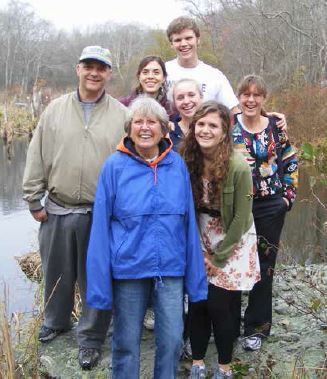Enjoying Nature - Without Remembering Names
Editorial by Meg Kerr, Senior Director of Policy
Names are elusive for me.
I have been known to forget the names of people I have been introduced to several times. The names of plants and birds are forgotten almost as soon as I learn them. I majored in biology in college and many of my classes required endless memorization. It was futile. I tried learning tricks and mnemonic devices for remembering scientific names. Then I would arrive at a test, proud to remember “poor fish no potatoes” while drawing a blank on the Latin name and whether it described a fish, plant or muscle in the leg of a rabbit. If I was lucky enough to remember both the trick and the scientific name, my brain lost them both as soon as I walked out the door. My mother, on the other hand, was a skilled naturalist and was able to instantly recognize and name birds and plants. It was effortless for her. Her many birding books were filled with careful notations of where and when she had sighted each bird. I loved walking with her and learning about nature, but was never able to grasp all of those names.
When I joined Audubon, my husband and I eagerly signed up for Lauren Parmelee’s excellent Beginning Birding class. I enjoyed every minute of it, especially the time we spent in the field. I picked up a lot of useful tricks for carefully observing birds. Sadly, even a class with Lauren did not transform my ability to name the
birds I see and hear.

Senior Director of Policy Meg Kerr (far right) on a hike with her family at Fisherville Brook Wildlife Refuge in 2007. Her mother, a skilled naturalist, is center in the blue jacket.
In addition to Lauren, Audubon has many wonderful naturalists on staff who are very comfortable naming plants and animals or identifying bird calls. Many Audubon members are also excellent naturalists and this expertise has helped collect the data in the Breeding Bird Atlas showcased in this edition of the Report. I realize that I will never be the type of naturalist who can identify native plants or confidently name a particular species of warbler. But I also know that I have a valuable place within the Audubon community. I understand concepts of ecology and biology even though I cannot name all the players.
In our work with pollinator health and habitats, I understand that bees need food and shelter and they are threatened by pesticides and a changing climate. I appreciate that there are many native bee species and that they require different types of habitats to thrive. My job as an advocate is to understand how state and local laws and policies affect pollinators and the land, water and air we all depend on. My role is to engage our expert naturalists, community partners and even our opponents in conversations about common goals. These collaborative efforts form the basis for my work convincing decision makers to care about the environment so that they will implement protective actions.
It is important to remember that people who care deeply about the environment are a diverse group representing a variety of backgrounds, skills and talents. Those without the skills of an Audubon naturalist can still appreciate the natural world and commit to its protection - even if we don’t know all the names.

















